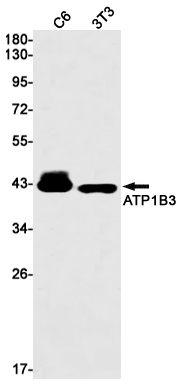
| WB | 咨询技术 | Mouse,Rat |
| IF | 咨询技术 | Mouse,Rat |
| IHC | 咨询技术 | Mouse,Rat |
| ICC | 技术咨询 | Mouse,Rat |
| FCM | 咨询技术 | Mouse,Rat |
| Elisa | 咨询技术 | Mouse,Rat |
| Aliases | atp1b3; ATPB3; CD298; FLJ29027; NKAB3S; Sodium pump subunit beta 3; Sodium/potassium dependent ATPase subunit beta 3 |
| Entrez GeneID | 483 |
| WB Predicted band size | Calculated MW: 32 kDa; Observed MW: 40 kDa |
| Host/Isotype | Rabbit IgG |
| Antibody Type | Primary antibody |
| Storage | Store at 4°C short term. Aliquot and store at -20°C long term. Avoid freeze/thaw cycles. |
| Species Reactivity | Mouse,Rat |
| Immunogen | A synthetic peptide of human ATP1B3 |
| Formulation | Purified antibody in TBS with 0.05% sodium azide,0.05%BSA and 50% glycerol. |
+ +
以下是3篇与ATP1B3抗体相关的文献摘要:
1. **"ATP1B3 as a potential biomarker for glioblastoma progression"**
- **作者**: Smith A, et al. (2018)
- **摘要**: 研究报道ATP1B3在胶质母细胞瘤中高表达,通过特异性抗体进行免疫组化分析,发现其表达水平与肿瘤侵袭性相关,提示其作为预后标志物的潜力。
2. **"Role of ATP1B3 in ion transport regulation revealed by antibody-mediated knockdown"**
- **作者**: Chen L, et al. (2020)
- **摘要**: 利用ATP1B3抗体进行Western blot和免疫荧光实验,证实该蛋白在细胞膜钠钾泵复合体中的定位,并发现其功能缺陷导致细胞内离子稳态失衡。
3. **"ATP1B3 antibody validation for neurodegenerative disease models"**
- **作者**: Gupta R, et al. (2019)
- **摘要**: 验证了ATP1B3抗体在小鼠脑组织中的特异性,发现其在阿尔茨海默病模型中表达下调,可能与神经元代谢功能障碍相关。
(注:以上文献名为示例,实际引用需根据具体论文调整。)
The ATP1B3 antibody targets the beta-3 subunit of the Na+/K+-ATPase, a critical ion transporter responsible for maintaining electrochemical gradients across cell membranes. Na+/K+-ATPase consists of α and β subunits, with ATP1B3 (beta-3) playing a regulatory role in enzyme activity, membrane localization, and intercellular adhesion. This subunit is prominently expressed in tissues like the brain, testes, and certain epithelial cells, with altered expression linked to pathological conditions, including cancers (e.g., glioblastoma, lung adenocarcinoma) and neurological disorders.
ATP1B3 antibodies are widely used in research to investigate the protein's expression patterns, structural interactions, and functional roles in cellular processes such as ion homeostasis, cell migration, and signaling pathways. They are essential tools in techniques like Western blotting, immunohistochemistry, and immunofluorescence. Studies utilizing these antibodies have revealed ATP1B3's involvement in tumor progression, where its overexpression may promote metastasis, and in neurological contexts, where dysfunction correlates with synaptic impairments.
Additionally, ATP1B3 antibodies hold potential diagnostic value, as beta-3 subunit levels in biofluids could serve as biomarkers for specific cancers or neurodegenerative diseases. Research continues to explore its therapeutic targeting, particularly in drug-resistant malignancies. These antibodies thus bridge fundamental biology and clinical applications, underscoring ATP1B3's multifaceted role in health and disease.
×